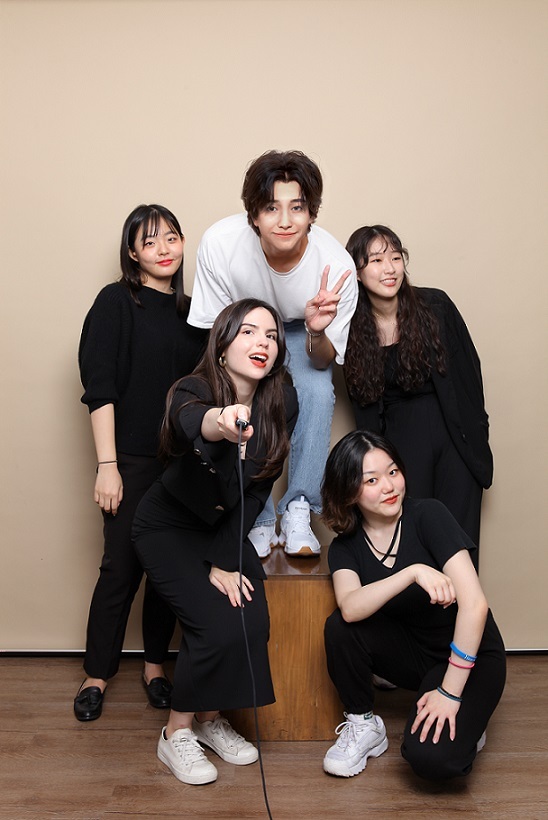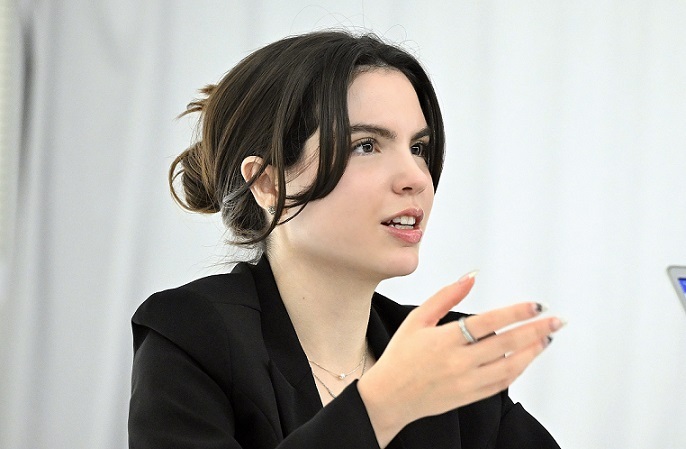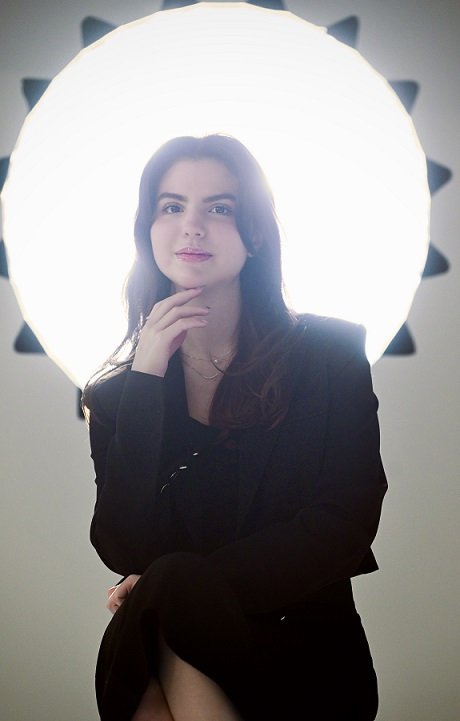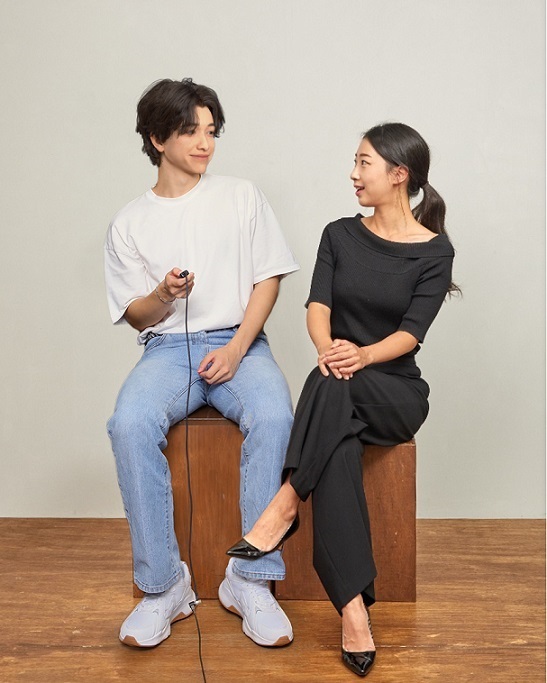 |
Theo (center) with Ventura (front row, left) and three other founding members of Virtual Human Power (VHP) |
Tall, handsome and sweet -- Theo is everything a girl wants.
He is the boy next door with curly hair, smiley eyes and an adorable and vibrant personality. He is effortlessly stylish and loves food and cooking. He also knows a thing or two about cool Korean stuff, as he is half-Korean and half-Brazilian.
Theo is a virtual human created by a Brazil-born K-pop fan-turned-entrepreneur in Seoul, with an aim of bridging the two worlds as Brazilians’ fascination with Korea grows.
“From ‘Squid Game’ to superband BTS, Hallyu is a real sensation in Brazil,” said Vittoria Ventura, a senior at Seoul’s Sogang University and CEO of startup Virtual Human Power, in an interview with The Korea Herald.
“I wanted Theo to become a channel through which Hallyu fans in Brazil, especially millennials and Generation Z, express their interest in Korea and learn about Korean culture,” she said.
Theo, your Korean idol next door
Theo started off as a class assignment.
Ventura, who majors in arts and technology -- a transdisciplinary course encompassing the humanities, arts, business and science -- had to come up with a business proposal for a class she took in the fall semester of 2020.
 |
Vittoria Ventura, a 26-year-old Brazilian Sogang University student and CEO of Virtual Human Power which created the virtual human influencer Theo in October last year, poses during an interview with The Korea Herald. (The Korea Herald) |
“I chose a virtual human as my business item, which seemed like a convergence of my academic interests in art, media and technology,” she said.
In January the following year, her idea finally turned into a real business. She founded Virtual Human Power with four other art and technology majors from Sogang University.
After months of research and development, Theo debuted to the world in October that year.
Theo is most active on Instagram, where he has about 10,000 followers. There, he shares photos and videos with messages written in Korean, Portuguese and English.
He seems to be enjoying the best of Korea and Brazil.
In one post, he poses in front of dazzling Christmas decorations on a street in Seoul. In another, he is enjoying a sunny beach in Brazil, an escape from the freezing winter in Seoul.
Korean dramas and food are among the topics that he talks about often.
He posts videos of himself making gimbap (seaweed rice rolls with vegetables) and mandu (Korean-style dumplings). When the Korean zombie series “All of Us Are Dead” came out on Netflix, he posted an image that features his face imposed on the title character Cheong-san’s body.
Many of Theo’s followers are young girls and women in Brazil -- a part of Ventura’s strategy to differentiate him from other virtual influencers. In fact, Theo’s gender has to do with the particular demographic she has chosen as the target audience.
“I myself was a big fan of BTS. I even went to the band’s concert held in Brazil in 2017,” the 26-year-old entrepreneur said, adding that her fascination with the Korean Wave has greatly affected how Theo’s character and personality came to be about.
 |
Vittoria Ventura, a 26-year-old Brazilian Sogang University student and CEO of Virtual Human Power which created the virtual human influencer Theo in October last year, poses during an interview with The Korea Herald. (The Korea Herald) |
What Ventura noticed in particular was how Korean men are stealing the hearts of girls around the world, with their looks, powerful performances and/or catchy songs, as seen in the global success of BTS.
“I wanted to capture this trend. So we started out with a male virtual influencer, targeting young Brazilian females,” she said.
Theo was created to be Brazilian girls’ personal Korean friend next door. He is gentle, caring and attractive just like a Korean idol, while also being approachable and down-to-earth.
“There’s a bit of a wall between actors or singers and the general audience. I wanted to make Theo feel like one of your neighbors, or somebody you can easily approach.”
Dreaming big
As a Brazilian who fell in love with Korea, it was Ventura’s personal goal to contribute to bringing the two countries closer. This is reflected in Theo’s mixed-raced identity.
“Mixed race individuals like Theo could sometimes feel displaced. Some might view their mixed identity as some sort of disadvantage. But I wanted to change that and show (being mixed race) as something of a privilege, because you can experience the best things of each culture and a beautiful synergy between them,” she said.
With Theo, she wanted to introduce Korea to Brazil and vice versa, and explore business opportunities in both countries.
But a relatively low demand among Korean users for content about Brazilian culture remains a challenge for Theo to expand his reach.
“Initially, we wanted to reach both Koreans and Brazilians, particularly the MZ (millennials and Generation Z). But we got much warmer responses from the Brazilian audience, and then we started to focus heavily on them,” she said.
Theo’s social media content are mainly in Portuguese with Korean or English supplementary translations, she explained.
"Many people in Brazil are willing to learn about Korean culture, but it doesn’t work the other way around. We’re trying to figure out ways to connect Theo more with the Korean audience.”
 |
This image shows Theo (left) beside Korea Herald reporter Choi Jae-hee. (Virtual Human Power) |
As a collegiate startup, Virtual Human Power reached a key milestone in November last year, securing funding from a Korean startup accelerator called D. Camp. It was among nine startups selected to receive investment.
Aside from the founder and CEO, VHP now has a team of six who play different roles from storytelling to video editing and brand marketing, she said.
Ventura sees a promising future for virtual human avatars and is aiming to create a team of virtual influencers. People will be able to relate to online personalities, although they are in essence not real, she said.
“It’s similar to when we watch a movie. Even though we know the scenario is fake, we can still relate to the emotions of fictional characters. This emotional connection is what we’re trying to establish between Theo and his fans.”
The creation of VHP’s second virtual human is currently in the works and the gender has not been decided yet, Ventura said.
As for Theo, her team will focus on finding ways to strengthen his fan base here in Korea.
Currently, Theo works with the Seoul Tourism Organization as one of the “Global Seoul Mates,” a select group of foreigners promoting Seoul’s attractions through digital content first formed in 2012.
“We want to do more collaborations with other Korean organizations and companies interested in promoting Korean culture or products, and also those in Brazil,” Ventura said.
By Choi Jae-hee (
cjh@heraldcorp.com)







![[Herald Interview] 'Trump will use tariffs as first line of defense for American manufacturing'](http://res.heraldm.com/phpwas/restmb_idxmake.php?idx=644&simg=/content/image/2024/11/26/20241126050017_0.jpg)

![[Health and care] Getting cancer young: Why cancer isn’t just an older person’s battle](http://res.heraldm.com/phpwas/restmb_idxmake.php?idx=644&simg=/content/image/2024/11/26/20241126050043_0.jpg)

